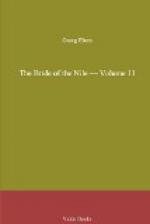After he had exchanged a few cordial words with them the widow prepared to withdraw, and was about to take leave when he went up to her and announced that he would pay her a visit the next day or the day after; that he wished to speak with her of matters involving the happiness of one who was dear to them both, and Dame Joanna, believing that he referred to Paula, whispered:
“She has no idea as yet of the terrible fate the people have in store for her. If possible, spare her the fearful truth before she sleeps this night.”
“If possible,” repeated the prelate. Then, as Mary kissed his hand before leaving, he drew her to him and said: “Like the Infant Christ, every Christian child is the Mother’s. You, Mary, are chosen before thousands! The Lord took your father to himself as a martyr; your mother has dedicated herself to Heaven. Your road is marked out for you, child, reflect on this. To-morrow-no, the day after, I will see you and guide you in the new path.”
At these words Joanna turned pale. She now understood what the bishop’s purpose was in calling on her. At the bottom of the stairs, she threw her arms round the child and asked her in—a low voice: “Do you pine for the cloister—do you wish to go away from us like your mother, to think of nothing but saving your soul, to live a nun in the holy seclusion which Pulcheria has described to you so often?”
But this the child positively denied; and as Joanna’s head drooped anxiously and sadly, Mary looked up brightly and exclaimed: “Never fear, Mother dear! Things will have altered greatly by the day after tomorrow. Let the bishop come! I shall be a match for him!—Oh! you do not know me yet. I have been like a lamb among you through all this misfortune and serious trouble; but there is something more in me than that. You will be quite astonished!”
“Nay, nay. Remain what you are,” the widow said.
“Always and ever full of love for you and Pul. But I am a grand and trusted person now! I have something very important to do for Orion to-morrow. Something—Rustem will go with me.—Important, very important, Mother Joanna. But what it is I must not tell—not even you!”
Here she was interrupted, for the heavy prison door opened for their exit.
It was many hours before it was again unlocked to let out the bishop, so long was he detained talking to Paula in her cell.
To his enquiry as to whether she was an orthodox Greek, or as the common people called it, a Melchite, she replied that she was the latter; adding that, if he had come with a view to perverting her from the confession of her forefathers, his visit was thrown away; at the same time she reverenced him as a Christian and a priest; as a learned man, and the friend whom her deceased uncle had esteemed above every other minister of his confession; she was gladly ready to disclose to him all that lay on her soul in the face of death. He looked into the pure, calm face; and though, at her first declaration, he had felt prompted to threaten her with the hideous end which he had but just done his utmost to avert, he now remembered the Greek widow’s request and bound himself to keep silence.




